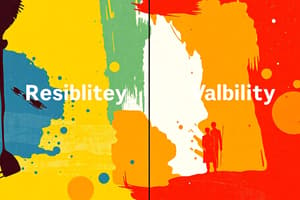Podcast
Questions and Answers
Which of the following best describes content validity?
Which of the following best describes content validity?
- A measure of validity based on evaluating the relationship between test scores and other variables
- A measure of validity obtained by evaluating the subjects, topics, or content covered by the items in the test (correct)
- A measure of validity based on an evaluation of the subjects, topics, or content covered by the items in the test
- A measure of validity based on a predictable variation in test scores as a function of membership in some group
What does the halo effect refer to?
What does the halo effect refer to?
- A measure of validity obtained by evaluating the subjects, topics, or content covered by the items in the test
- A measure of validity based on a predictable variation in test scores as a function of membership in some group
- A tendency to give a particular person a higher rating than they objectively deserve due to a favorable overall impression (correct)
- A measure of validity based on evaluating the relationship between test scores and other variables
What is local validation?
What is local validation?
- A measure of validity based on a predictable variation in test scores as a function of membership in some group
- A measure of validity obtained by evaluating the subjects, topics, or content covered by the items in the test
- A measure of validity based on evaluating the relationship between test scores and other variables
- A process of gathering and evaluating evidence about validity (correct)
What is discriminant evidence?
What is discriminant evidence?
What is validation?
What is validation?
Flashcards are hidden until you start studying
Study Notes
Validation and Related Concepts
- Content validity: Refers to the extent to which a measure assesses the specific characteristic or concept it is supposed to measure.
- Halo effect: A cognitive bias where the overall impression of a person, object, or situation influences opinions or ratings of specific traits or characteristics.
- Local validation: Not a standard term in research methodology; may refer to the process of validating a measure or instrument within a specific local context or population.
- Discriminant evidence: A type of validity evidence that examines whether a measure correlates differently with variables it is supposed to be related to versus those it is not supposed to be related to.
- Validation: The process of determining the accuracy and credibility of a measure, instrument, or research finding by examining its relationship with other variables, observations, or criteria.
Studying That Suits You
Use AI to generate personalized quizzes and flashcards to suit your learning preferences.




